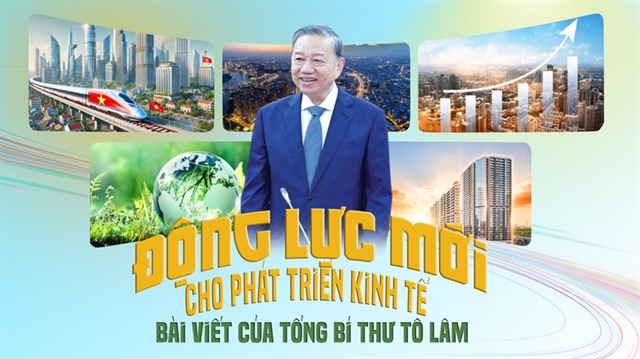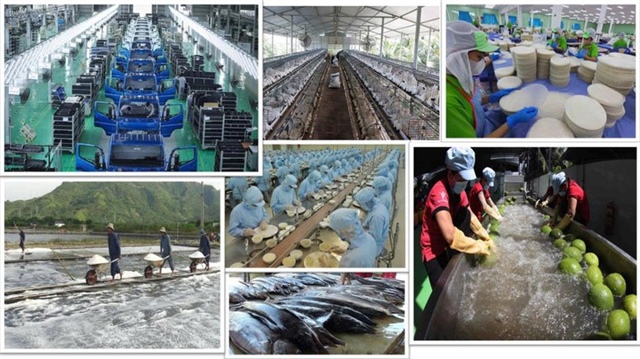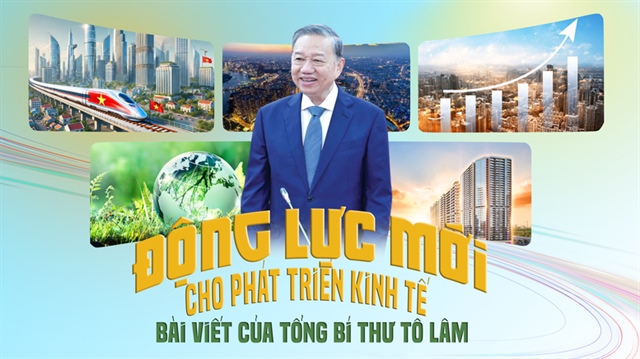
The article “New Impetus for Economic Development” by General Secretary To Lam is a significant milestone in the theoretical and practical thinking about Vietnam’s economic development in the new era. |
Going beyond the concretization of Resolution 68-NQ/TW of the Politburo on private sector development, the article takes a more comprehensive approach by interconnecting three strategic dimensions of thought: applying the spirit of Marxism-Leninism to the theory of private economic development; profoundly explaining why private sector development is the appropriate path to building socialism; and proposing a breakthrough institutional reform agenda based on the successful practices of China, Russia, and Vietnam itself.
From this ideological foundation, the General Secretary opens up a profound direction for action: for sustainable development, Vietnam needs a new way of thinking, and this new thinking will be the impetus for the nation to rise to prosperity and strength.
Theoretical Legitimacy for the Private Sector
A valuable contribution of the article is its affirmation of the theoretical legitimacy of the private sector in the context of building socialism. The General Secretary refers to Lenin’s thoughts in the New Economic Policy (NEP), where the Russian revolutionary leader proactively restored market elements and private enterprise to revive the post-war economy. Lenin stated, “We do not deny state capitalism… but use it as a means of transition to socialism.”
The General Secretary adeptly applies this spirit in a modern context: private ownership, when guided by the right institutional framework and effective control of power, will not hinder the process of socialism but, on the contrary, can accelerate it through growth, innovation, and improved living standards for the people.
This is a significant step forward in theoretical thinking. Along with Resolution 68, it helps resolve decades-long prejudices about the opposition between socialism and private economic development, while also providing a solid foundation for current development policies.
An Effective Means to Realizing Socialist Goals
The General Secretary’s article not only clarifies the theoretical aspect but also points out the organic relationship between private sector development and the realization of core socialist values.
A society that is “rich, strong, democratic, equitable, and civilized” cannot be established without growth drivers, jobs, and resources for education, healthcare, and social welfare. Meanwhile, the private sector contributes over 51% of GDP, more than 82% of employment, and is increasingly going global. The private sector, if unblocked and protected, is the most practical resource for building a harmonious and equitable society in the true spirit of Vietnamese socialism.
It is no coincidence that the General Secretary affirms: “The Party and the State do not stand outside the economy but must proactively design the development space, create a fair ecosystem, and protect the fundamental values of the market.”

The maturation of the domestic private sector is one of the most important achievements of the renewal process. |
Reflecting on Practical Examples
The persuasiveness of the article is further strengthened as the General Secretary compares his thinking with typical practical examples.
China, with its model of “socialism with Chinese characteristics,” is the most compelling evidence. The private sector there contributes more than 60% of GDP, 70% of innovation, 80% of urban employment, and 90% of new businesses. China’s miraculous development over the past four decades is inseparable from its bold institutional reforms and unleashing of the private sector.
The Russian Federation, after abandoning the rigid planned economic model, also had to reaffirm the role of private ownership as a condition for economic recovery and international integration. The General Secretary recalls this reality as historical proof of the inevitability of reform.
Vietnam, in its 40 years of renewal, has also proven that it was only when the thinking about the market and ownership was liberated that the economy gained vitality. The maturation of the domestic private sector is one of the most important achievements of the renewal process.
Breakthrough Solutions Proposed
The article not only affirms a new way of thinking but also proposes more robust and specific action plans, even surpassing the content of Resolution 68-NQ/TW in some aspects.
Firstly, it suggests the creation of a Law on Private Economic Development – a specialized law that institutionalizes the role, rights, and obligations of this sector. Secondly, it proposes the establishment of a National Steering Committee for Private Economic Development, headed by the Prime Minister, reflecting the highest political determination and clear commitment to action.
The General Secretary also sets the goal of forming a contingent of patriotic, cultured, and responsible entrepreneurs who serve the nation. He speaks not only of growth but also of the civic qualities of entrepreneurs in a socialist-oriented market economy.
Along with this are comprehensive institutional reform solutions: from ensuring a fair competitive environment, protecting property rights, and simplifying administrative procedures to developing an innovative ecosystem, promoting digital transformation, and addressing market distortions and vested interests.
A Breakthrough in Development Thinking
The article by General Secretary To Lam is a document of special theoretical and practical significance. It not only legitimizes private economic development within Marxist-Leninist thought but also puts forward reform orientations that are fundamentally moving. More importantly, it is a thinking for action, where institutions, markets, and people converge to create a new development impetus.
“New impetus from new thinking” is the key message of the article. If seriously institutionalized and vigorously implemented, it will become a powerful force, propelling Vietnam into an era of modern, sustainable, and humane development.
Dr. Nguyen Si Dung
The Consumer-Retail Business: Actualizing the Spirit of Resolution 68-NQ/TW
Amidst the backdrop of Resolution 68/NQ-TW, which emphasizes the formation and development of large private economic groups with competitive regional capabilities, as initiated by the Government, Masan Group Corporation (HOSE: MSN) is poised to lead the way as a key player in the private sector. With a sharp focus on the domestic market, Masan Group is well-positioned to become one of the powerhouse conglomerates, deeply integrated into both local and international value chains.
Senior S&P Official: Vietnam Capable of Enhancing National Credit Rating
The experts at S&P Global Ratings are highly impressed with the contents of Resolution No. 68-NQ/TW and Vietnam’s ongoing efforts in administrative unit reorganization and streamlining of apparatus. With such robust reforms, they firmly believe that Vietnam’s economy will experience rapid growth, and the country’s credit rating is poised for an upgrade in the near future.
How to Instill Confidence in People to Invest Their Money?
The proposal to develop a Law on Private Economic Development is an exciting and much-anticipated development. This law has the potential to revolutionize the economic landscape, offering a unified policy framework and resolving long-standing contradictions and overlaps that have hindered businesses. With this law, we can expect a new era of economic growth and a more conducive environment for private enterprises to thrive.
“Dr. Nguyen Van Dinh: Resolution 68 Becomes a ‘Revolution’ for the Real Estate Market”
“The renowned academic, Dr. Nguyen Van Dinh, highlights the groundbreaking nature of Resolution 68, describing it as a ‘true revolution in mechanism’. This resolution marks a pivotal moment as, for the first time, a high-level document emphatically acknowledges the pivotal role of private enterprises.





















